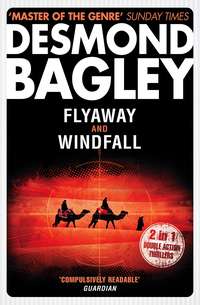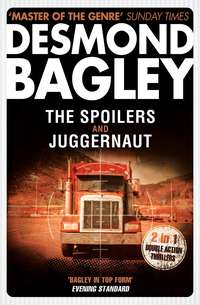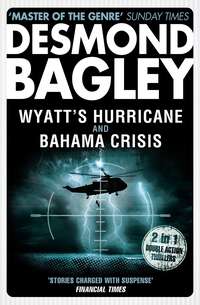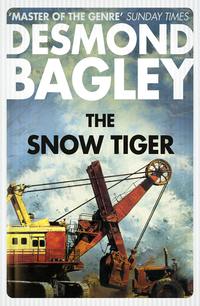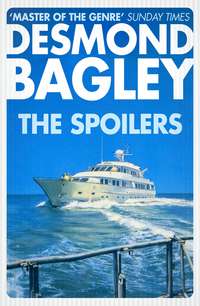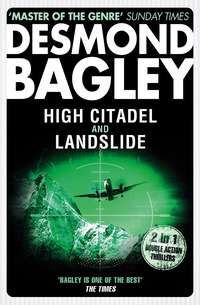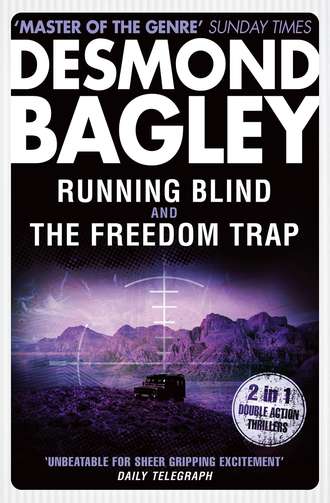
Полная версия
Running Blind / The Freedom Trap
‘Because it had to look good,’ I said. ‘The operation would be examined by men with very hard eyes and there had to be real blood, not tomato ketchup – no fakery at all. The blood was provided by poor Birkby – and Kennikin added some to it.’ A sudden thought struck me. ‘I wonder if Kennikin knew what was going on? I’ll bet his organization was blasted from under him – the poor bastard wouldn’t know his masters were selling him out just to bring Slade up a notch.’ I rubbed my chin. ‘I wonder if he’s still ignorant of that?’
‘This is all theory,’ said Elin. ‘Things don’t happen that way.’
‘Don’t they? My God, you only have to read the published accounts of some of the spy trials to realize that bloody funny things happen. Do you know why Blake got a sentence of forty-two years in jail?’
She shook her head. ‘I didn’t read about it.’
‘You won’t find it in print, but the rumour around the Department was that forty-two was the number of our agents who came to a sticky end because he’d betrayed them. I wouldn’t know the truth of it because he was in a different outfit – but think of what Slade could do!’
‘So you can’t trust anyone,’ said Elin. ‘What a life to lead!’
‘It’s not as bad as that. I trust Taggart to a point – and I trust Jack Case, the man I’m meeting at Geysir. But Slade is different; he’s become careless and made two mistakes – one about the Calvados, and the other in coming after the package himself.’
Elin laughed derisively. ‘And the only reason you trust Taggart and Case is because they’ve made no mistakes, as you call them?’
‘Let me put it this way,’ I said. ‘I’ve killed Graham, a British intelligence agent, and so I’m in a hot spot. The only way I can get out of it is to prove that Slade is a Russian agent. If I can do that I’ll be a bloody hero and the record will be wiped clean. And it helps a lot that I hate Slade’s guts.’
‘But what if you’re wrong?’
I put as much finality into my voice as I could. ‘I’m not wrong,’ I said, and hoped it was true. ‘We’ve had a long hard day, Elin; but we can rest tomorrow. Let me put a dressing on your shoulder.’
As I smoothed down the last piece of surgical tape, she said, ‘What did you make of what Taggart said just before the storm came?’
I didn’t like to think of that. ‘I think,’ I said carefully, ‘that he was telling me that Kennikin is in Iceland.’
II
Tired though I was after a hard day’s driving I slept badly. The wind howled from the west across the crater of Askja, buffeting the Land-Rover until it rocked on its springs, and the heavy rain drummed against the side. Once I heard a clatter as though something metallic had moved and I got up to investigate only to find nothing of consequence and got drenched to the skin for my pains. At last I fell into a heavy sleep, shot through with bad dreams.
Still, I felt better in the morning when I got up and looked out. The sun was shining and the lake was a deep blue reflecting the cloudless sky, and in the clear, rain-washed air the far side of the crater seemed a mere kilometre away instead of the ten kilometres it really was. I put water to boil for coffee and when it was ready I leaned over and dug Elin gently in the ribs.
‘Umph!’ she said indistinctly, and snuggled deeper into the sleeping bag. I prodded her again and one blue eye opened and looked at me malignantly through tumbled blonde hair. ‘Stop it!’
‘Coffee,’ I said, and waved the cup under her nose.
She came to life and clutched the cup with both hands. I took my coffee and a jug of hot water and went outside where I laid my shaving kit on the bonnet and began to whisk up a lather. After shaving, I thought, it would be nice to go down to the lake and clean up. I was beginning to feel grubby – the Odàdahraun is a dusty place – and the thought of clean water was good.
I finished scraping my face and, as I rinsed the lather away, I ran through in my mind the things I had to do, the most important of which was to contact Taggart as soon as it was a reasonable hour to find him in his office. I wanted to give him the detailed case against Slade.
Elin came up with the coffee pot. ‘More?’
‘Thanks,’ I said, holding out my cup. ‘We’ll have a lazy day.’ I nodded towards the lake at the bottom of the crater. ‘Fancy a swim?’
She pulled a face and moved her wounded shoulder. ‘I can’t do the crawl, but perhaps I can paddle with one arm.’ She looked up at the sky, and said, ‘It’s a lovely day.’
I watched her face change. ‘What’s the matter?’
‘The radio antenna,’ she said. ‘It’s not there.’
I whirled around. ‘Damn!’ That was very bad. I climbed up and looked at the damage. It was easy to see what had happened. The rough ground in Central Iceland is enough to shake anything loose that isn’t welded down; nuts you couldn’t shift with a wrench somehow loosen themselves and wind off the bolts; split-pins jump out, even rivets pop. A whip antenna with its swaying motion is particularly vulnerable; I know one geologist who lost three in a month. The question here was when did we lose it?
It was certainly after I had spoken to Taggart, so it might have gone during the mad dash for Askja when we raced the storm. But I remembered the metallic clatter I had heard during the night; the antenna might have been loosened enough by the bumping to have been swept away by the strong wind. I said, ‘It may be around here – quite close. Let’s look.’
But we didn’t get that far because I heard a familiar sound – the drone of a small aircraft. ‘Get down!’ I said quickly. ‘Keep still and don’t look up.’
We dropped flat next to the Land-Rover as the light plane came over the edge of the crater wall flying low. As it cleared the edge it dipped down into the crater to our left. I said, ‘Whatever you do, don’t lift your head. Nothing stands out so much as a white face.’
The plane flew low over the lake and then turned, spiralling out into a search pattern to survey the interior of the crater. It looked to me like a four-seater Cessna from the brief glimpse I got of it. The Land-Rover was parked in a jumble of big rocks, split into blocks by ice and water, and maybe it wouldn’t show up too well from the air providing there was no movement around it.
Elin said quietly, ‘Do you think it’s someone looking for us?’
‘We’ll have to assume so,’ I said. ‘It could be a charter plane full of tourists looking at the Óbyggdir from the air, but it’s a bit early in the day for that – tourists aren’t awake much before nine o’clock.’
This was a development I hadn’t thought of. Damn it, Slade was right; I was out of practice. Tracks in the Óbyggdir are few and it would be no great effort to keep them under surveillance from the air and to direct ground transport by radio. The fact that my Land-Rover was the long wheelbase type would make identification easier – there weren’t many of those about.
The plane finished quartering the crater and climbed again, heading north-west. I watched it go but made no move. Elin said, ‘Do you think we were seen?’
‘I don’t know that, either. Stop asking unanswerable questions – and don’t move because it may come back for another sweep.’
I gave it five minutes and used the time to figure out what to do next. There would be no refreshing swim in the lake, that was certain. Askja was as secluded a place as anywhere in Iceland but it had one fatal flaw – the track into the crater was a spur from the main track – a dead end – and if anyone blocked the way out of the crater there’d be no getting past, not with the Land-Rover. And I didn’t have any illusions about the practicability of going anywhere on foot – you can get very dead that way in the Óbyggdir.
‘We’re getting out of here fast,’ I said. ‘I want to be on the main track where we have some choice of action. Let’s move!’
‘Breakfast?’
‘Breakfast can wait.’
‘And the radio antenna?’
I paused, indecisive and exasperated. We needed that antenna – I had to talk to Taggart – but if we had been spotted from the air then a car full of guns could be speeding towards Askja, and I didn’t know how much time we had in hand. The antenna could be close by but, on the other hand, it might have dropped off somewhere up the track and miles away.
I made the decision. ‘The hell with it! Let’s go.’
There was no packing to do beyond collecting the coffee cups and my shaving kit and within two minutes we were climbing the narrow track on the way out of Askja. It was ten kilometres to the main track and when we got there I was sweating for fear of what I might find, but nothing was stirring. I turned right and we headed south.
An hour later I pulled up where the track forked. On the left ran the Jökulsá á Fjöllum, now near its source and no longer the mighty force it displayed at Dettifoss. I said, ‘We’ll have breakfast here.’
‘Why here particularly?’
I pointed to the fork ahead. ‘We have a three-way choice – we can go back or take either of those tracks. If that plane is going to come back and spot us I’d just as soon he did it here. He can’t stay up there forever so we wait him out before we move on and leave him to figure which way we went.’
While Elin was fixing breakfast I took the rifle I had liberated from Graham and examined it. I unloaded it and looked down the bore. This was no way to treat a good gun; not to clean it after shooting. Fortunately, modern powder is no longer so violently corrosive and a day’s wait before cleaning no longer such a heinous offence. Besides, I had neither gun oil nor solvent and engine oil would have to do.
I checked the ammunition after cleaning the rifle. Graham had loaded from a packet of twenty-five; he had shot one and I had popped off three at Slade – twenty-one rounds left. I set the sights of the rifle at a hundred yards. I didn’t think that if things came to the crunch I’d be shooting at much over that range. Only film heroes can take a strange gun and unknown ammunition and drop the baddy at 500 yards.
I put the rifle where I could get at it easily and caught a disapproving glance from Elin. ‘Well, what do you expect me to do?’ I said defensively. ‘Start throwing rocks?’
‘I didn’t say anything,’ she said.
‘No, you didn’t,’ I agreed. ‘I’m going down to the river to clean up. Give me a shout when you’re ready.’
But first I climbed a small knoll from where I could get a good view of the surrounding country. Nothing moved for as far as I could see, and in Iceland you can usually see a hell of a long way. Satisfied, I went down to the river which was the milky grey-green colour of melt water and shockingly cold, but after the first painful gasp it wasn’t too bad. Refreshed, I went back to tuck into breakfast.
Elin was looking at the map. ‘Which way are you going?’
‘I want to get between Hofsjökull and Vatnajökull,’ I said. ‘So we take the left fork.’
‘It’s a one-way track,’ said Elin and passed me the map.
True enough. Printed in ominous red alongside the dashed line which denoted the track was the stern injunction: Adeins faert til austurs – eastward travel only. We wanted to go to the west.
I frowned. Most people think that because Greenland is covered with ice and is wrongly named then so is Iceland, and there’s not much ice about the place. They’re dead wrong. Thirty-six icefields glaciate one-eighth of the country and one of them alone – Vatnajökull – is as big as all the glaciated areas in Scandinavia and the Alps put together.
The cold wastes of Vatnajökull lay just to the south of us and the track to the west was squeezed right up against it by the rearing bulk of Trölladyngja – the Dome of Trolls – a vast shield volcano. I had never been that way before but I had a good idea why the track was one way only. It would cling to the sides of cliffs and be full of hair-pin blind bends – quite hairy enough to negotiate without the unnerving possibility of running into someone head on.
I sighed and examined other possibilities. The track to the right would take us north, the opposite direction to which I wanted to go. More damaging, to get back again would triple the mileage. The geography of Iceland has its own ruthless logic about what is and what is not permitted and the choice of routes is restricted.
I said, ‘We’ll take our chances going the short way and hope to God we don’t meet anyone. It’s still early in the season and the chances are good.’ I grinned at Elin. ‘I don’t think there’ll be any police around to issue a traffic ticket.’
‘And there’ll be no ambulance to pick us up from the bottom of a cliff,’ she said.
‘I’m a careful driver; it may never happen.’
Elin went down to the river and I walked to the top of the knoll again. Everything was quiet. The track stretched back towards Askja and there was no tell-tale cloud of dust to indicate a pursuing vehicle, nor any mysterious aircraft buzzing about the sky. I wondered if I was letting my imagination get the better of me. Perhaps I was running away from nothing.
The guilty flee where no man pursueth. I was as guilty as hell! I had withheld the package from Slade on nothing more than intuition – a hunch Taggart found difficult to believe. And I had killed Graham! As far as the Department was concerned I would already have been judged, found guilty and sentenced, and I wondered what would be the attitude of Jack Case when I saw him at Geysir.
I saw Elin returning to the Land-Rover so I took one last look around and went down to her. Her hair was damp and her cheeks glowed pink as she scrubbed her face with a towel. I waited until she emerged, then said, ‘You’re in this as much as I am now, so you’ve got a vote. What do you think I should do?’
She lowered the towel and looked at me thoughtfully. ‘I should do exactly what you are doing. You’ve made the plan. Meet this man at Geysir and give him that … that whatever-it-is.’
I nodded. ‘And what if someone should try to stop us?’
She hesitated. ‘If it is Slade, then give him the gadget. If it is Kennikin … ’ She stopped and shook her head slowly.
I saw her reasoning. I might be able to hand over to Slade and get away unscathed; but Kennikin would not be satisfied with that – he’d want my blood. I said, ‘Supposing it is Kennikin – what would you expect me to do?’
She drooped. ‘I think you would want to fight him – to use that rifle. You would want to kill him.’ Her voice was desolate.
I took her by the arm. ‘Elin, I don’t kill people indiscriminately. I’m not a psychopath. I promise there will be no killing unless it is in self defence; unless my life is in danger – or yours.’
‘I’m sorry, Alan,’ she said. ‘But a situation like this is so alien to me. I’ve never had to face anything like it.’
I waved towards the knoll. ‘I was doing a bit of thinking up there. It occurred to me that perhaps my assessment of everything has been wrong – that I’ve misjudged people and events.’
‘No!’ she said definitely. ‘You’ve made a strong case against Slade.’
‘And yet you would want me to give him the gadget?’
‘What is it to me?’ she cried. ‘Or to you? Let him have it when the time comes – let us go back to living our own lives.’
‘I’d like to do that very much,’ I said. ‘If people would let me.’ I looked up at the sun which was already high. ‘Come on; let’s be on our way.’
As we drove towards the fork I glanced at Elin’s set face and sighed. I could quite understand her attitude, which was that of any other Icelander. Long gone are the days when the Vikings were the scourge of Europe, and the Icelanders have lived in isolation for so many years that the affairs of the rest of the world must seem remote and alien.
Their only battle has been to regain their political independence from Denmark and that was achieved by peaceful negotiation. True, they are not so isolated that their economy is separated from world trade – far from it – but trade is trade and war, whether open or covert, is something for other crazy people and not for sober, sensible Icelanders.
They are so confident that no one can envy their country enough to seize it that they have no armed forces. After all, if the Icelanders with their thousand years of experience behind them still find it most difficult to scratch a living out of the country then who else in his right mind would want it?
A peaceful people with no first-hand knowledge of war. It was hardly surprising that Elin found the shenanigans in which I was involved distasteful and dirty. I didn’t feel too clean myself.
III
The track was bad.
It was bad right from where we had stopped and it got steadily worse after we had left the river and began to climb under Vatnajökull. I crunched down into low gear and went into four-wheel drive as the track snaked its way up the cliffs, doubling back on itself so often that I had a zany idea I might drive into my own rear. It was wide enough only for one vehicle and I crept around each corner hoping to God that no one was coming the other way.
Once there was a slide of rubble sideways and I felt the Land-Rover slip with rear wheels spinning towards the edge of a sheer drop. I poured on the juice and hoped for the best. The front wheels held their grip and hauled us to safety. Soon after that I stopped on a reasonably straight bit, and when I took my hands from the wheel they were wet with sweat.
I wiped them dry. ‘This is bloody tricky.’
‘Shall I drive for a while?’ asked Elin.
I shook my head. ‘Not with your bad shoulder. Besides, it’s not the driving – it’s the expectation of meeting someone around every corner.’ I looked over the edge of the cliff. ‘One of us would have to reverse out and that’s a flat impossibility.’ That was the best that could happen; the worst didn’t bear thinking about. No wonder this track was one way only.
‘I could walk ahead,’ Elin said. ‘I can check around the corners and guide you.’
‘That would take all day,’ I objected. ‘And we’ve a long way to go.’
She jerked her thumb downwards. ‘Better than going down there. Besides, we’re not moving at much more than a walking pace as it is. I can stand on the front bumper while we go on the straight runs and jump off at the corners.’
It was an idea that had its points but I didn’t like it much. ‘It won’t do your shoulder much good.’
‘I can use the other arm,’ she said impatiently, and opened the door to get out.
At one time in England there was a law to the effect that every mechanically propelled vehicle on the public highway must be preceded by a man on foot bearing a red flag to warn the unwary citizenry of the juggernaut bearing down upon them. I had never expected to be put in the same position, but that’s progress.
Elin would ride the bumper until we approached a corner and jump off as I slowed down. Slowing down was no trick at all, even going down hill; all I had to do was to take my foot off the accelerator. I had dropped into the lowest gear possible which, on a Land-Rover is something wondrous. That final drive ratio of about 40:1 gives a lot of traction and a lot of engine braking. Driven flat out when cranked as low as that the old girl would make all of nine miles an hour when delivering ninety-five horsepower – and a hell of a lot of traction was just what I needed on that Icelandic roller-coaster. But it was hell on fuel consumption.
So Elin would guide me around a corner and then ride the bumper to the next one. It sounds as though it might have been a slow job but curiously enough we seemed to make better time. We went on in this dot-and-carry-one manner for quite a long way and then Elin held up her hand and pointed, not down the track but away in the air to the right. As she started to hurry back I twisted my neck to see what she had seen.
A helicopter was coming over Trölladyngja like a grasshopper, the sun making a spinning disc of its rotor and striking reflections from the greenhouse which designers put on choppers for their own weird reasons. I’ve flown by helicopter on many occasions and on a sunny day you feel like a ripening tomato under glass.
But I wasn’t thinking about that right then because Elin had come up on the wrong side of the Land-Rover. ‘Get to the other side,’ I shouted. ‘Get under cover.’ I dived out of the door on the other side where the cliff face was.
She joined me. ‘Trouble?’
‘Could be.’ I held open the door and grabbed the carbine. ‘We’ve seen no vehicles so far, but two aircraft have been interested in us. That seems unnatural.’
I peered around the rear end of the Land-Rover, keeping the gun out of sight. The helicopter was still heading towards us and losing height. When it was quite close the nose came up and it bobbed and curtsied in the air as it came to a hovering stop about a hundred yards away. Then it came down like a lift until it was level with us.
I sweated and gripped the carbine. Sitting on the ledge we were like ducks in a shooting gallery, and all that was between us and any bullets was the Land-Rover. It’s a stoutly built vehicle but at that moment I wished it was an armoured car. The chopper ducked and swayed and regarded us interestedly, but I could see no human movement beyond the reflections echoed from the glass of the cockpit.
Then the fuselage began to rotate slowly until it was turned broadside on, and I let out my breath in a long sigh. Painted in large letters along the side was the single word – NAVY – and I relaxed, put down the carbine and went into the open. If there was one place where Kennikin would not be it was inside a US Navy Sikorsky LH-34 chopper.
I waved, and said to Elin, ‘It’s all right; you can come out.’
She joined me and we looked at the helicopter. A door in the side slid open and a crewman appeared wearing a white bone-dome helmet. He leaned out, holding on with one hand, and made a whirling motion with the other and then put his fist to the side of his face. He did this two or three times before I tumbled to what he was doing.
‘He wants us to use the telephone,’ I said. ‘A pity we can’t.’ I climbed on top of the Land-Rover and pointed as eloquently as I could to where the whip antenna had been. The crewman caught on fast; he waved and drew himself back inside and the door closed. Within a few seconds the helicopter reared up and gained height, the fuselage turning until it was pointing south-west, and then away it went until it disappeared into the distance with a fading roar.
I looked at Elin. ‘What do you suppose that was about?’
‘It seemed they want to talk to you. Perhaps the helicopter will land farther down the track.’
‘It certainly couldn’t land here,’ I said. ‘Maybe you’re right. I could do with a trip back to Keflavik in comfort.’ I looked into the thin air into which the chopper had vanished. ‘But nobody told me the Americans were in on this.’
Elin gave me a sidelong look. ‘In on what?’
‘I don’t know, damn it! I wish to hell I did.’ I retrieved the carbine. ‘Let’s get on with it.’
So on we went along that bastard of a track, round and round, up and down, but mostly up, until we had climbed right to the edge of Vatnajökull, next to the ice. The track could only go one way from there and that was away, so it turned at right-angles to the ice field and from then on the direction was mostly down. There was one more particularly nasty bit where we had to climb an outlying ridge of Trölladyngja but from then on the track improved and I called Elin aboard again.
I looked back the way we had come and was thankful for one thing; it had been a bright, sunny day. If there had been mist or much rain it would have been impossible. I checked the map and found we were through the one-way section for which I was heartily thankful.


